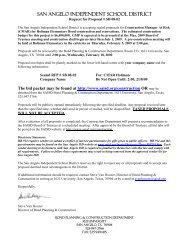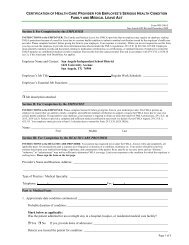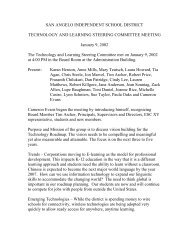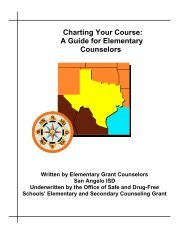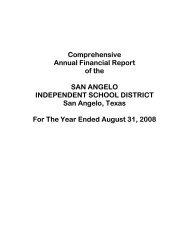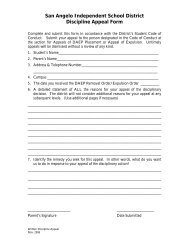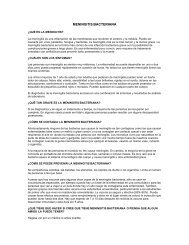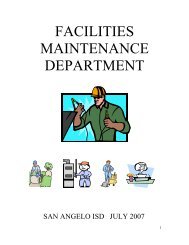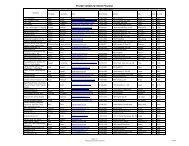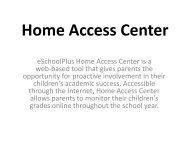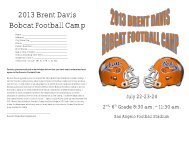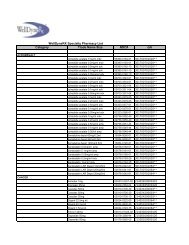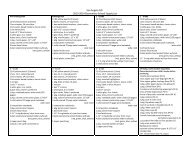Form Pb-110: Parent Questionnaire â Risk Assessment for Lead ...
Form Pb-110: Parent Questionnaire â Risk Assessment for Lead ...
Form Pb-110: Parent Questionnaire â Risk Assessment for Lead ...
You also want an ePaper? Increase the reach of your titles
YUMPU automatically turns print PDFs into web optimized ePapers that Google loves.
<strong>Form</strong> <strong>Pb</strong>-<strong>110</strong>: <strong>Parent</strong> <strong>Questionnaire</strong> – <strong>Risk</strong> <strong>Assessment</strong> <strong>for</strong> <strong>Lead</strong> Exposure<br />
NOTES to Healthcare Provider:<br />
• This risk assessment questionnaire replaces, and should be used in place of, the Abbreviated and<br />
the Detailed <strong>Parent</strong> <strong>Questionnaire</strong>s. Questions appear on reverse.<br />
• The risk assessment questionnaire is designed to be administered to the parent by the provider.<br />
Questions are provided in English along with Spanish versions to assist with Spanish speaking<br />
parents.<br />
Instructions:<br />
• Medicaid requires a blood lead test at 12 months and 24 months <strong>for</strong> all Texas Health Steps patients. This questionnaire<br />
may be used with any child, whether or not enrolled in Texas Health Steps.<br />
• At any visit, you may choose to per<strong>for</strong>m a blood lead test rather than use the risk assessment questionnaire.<br />
• At any visit after 12 months of age, you must administer a blood lead test if there is no evidence of a previous blood<br />
lead test <strong>for</strong> the patient.<br />
• Refer to the table below <strong>for</strong> scheduling use of the risk assessment questionnaire.<br />
• A “yes” or “don’t know” answer to any question on the risk assessment questionnaire indicates that a blood lead test<br />
should be administered.<br />
Schedule <strong>for</strong> Blood <strong>Lead</strong> Testing and Use of <strong>Risk</strong> <strong>Assessment</strong> <strong>Questionnaire</strong><br />
Child’s Age <strong>Parent</strong> <strong>Questionnaire</strong> Blood <strong>Lead</strong> Test<br />
6 months YES<br />
9 months YES<br />
12 months YES<br />
15 months YES<br />
18 months YES<br />
24 months YES<br />
3, 4, 5, 6, years YES<br />
For more in<strong>for</strong>mation, contact the Texas Childhood <strong>Lead</strong> Poisoning Prevention Program at:<br />
1-800-588-1248<br />
http://www.dshs.state.tx.us/lead<br />
Fax completed <strong>for</strong>m to 512-458-7699, or mail to the address below<br />
Texas Childhood <strong>Lead</strong> Poisoning Prevention Program<br />
Epidemiology & Surveillance Unit • Texas Department of State Health Services<br />
PO BOX 149347 • Austin, TX 78714-9347 Page 1 of 2 #<strong>Pb</strong>-<strong>110</strong> 02-08-08
Patient’s Name: DOB: Medicaid #:<br />
Provider’s Name: Administered by: Date:<br />
<strong>Parent</strong> <strong>Questionnaire</strong> – <strong>Risk</strong> <strong>Assessment</strong> <strong>for</strong> <strong>Lead</strong> Exposure<br />
Yes Don’t Know No<br />
1 Does your child live in or often visit a h ome, daycare facility, or other building<br />
- that was probably built be<strong>for</strong>e 1978?<br />
- with ongoing repairs or remodeling?<br />
2 Does your child eat or chew on non-food things like paint chips or dirt?<br />
3 Does your child reside in a household or has contact with an individual with an elevated blood lead level?<br />
4 Is your child frequently exposed to any of the following (if YES, check all that apply):<br />
Contamination from a parent, relative, or friend with jobs or hobbies like these?<br />
❏ Radiator repair ❏ House construction or repair ❏ Chemical preparation<br />
❏ Pottery making ❏ Battery manufacture or repair ❏ Valve and pipe fittings<br />
❏ <strong>Lead</strong> smelting<br />
❏ Burning lead-painted wood ❏ Brass/copper foundry<br />
❏ Welding ❏ Automotive repair shop or junkyard ❏ Refinishing furniture<br />
❏ Making fishing weights ❏ Going to a firing range or reloading bullets ❏ Other:<br />
Per<strong>for</strong>m a Blood <strong>Lead</strong> Test<br />
Sources of lead in food and remedies?<br />
❏ Imported or glazed pottery such as a Mexican bean pot<br />
❏ Imported candy, (like Chaca Chaca) especially from Mexico<br />
❏ Nutritional pills other than vitamins<br />
❏ Other:<br />
❏ Foods canned or packaged outside the U.S.<br />
❏ Remedies such as greta, azarcón, alarcón, alkohl,<br />
bali goli, coral, ghasard, liga, pay-loo-ah, rueda<br />
Cuestionario de Padre Sí No lo se No<br />
1 ¿Vive su hijo(a) en o visita frecuentemente una casa centro de guardería u otro edificio<br />
- que probablemente haya sido construida antes de 1978?<br />
- que está siendo pintada, remodelada, o en la que están pelando o lijando la pintura?<br />
2 ¿Su hijo(a) come o mastica cosas que no son comida, como pedazos de pintura or tierra?<br />
3 ¿Han tenido parientes o compañeritos de juego de su hijo(a) altos niveles de plomo en la sangre?<br />
4 Ha sido expuesto frecuentemente su hijo(a) a cualquier de los siguientes (sí SÍ, marque todos que apliquen:<br />
Contaminación de un padre, par iente, o amigo con trabajos o pasatiempos como estas?<br />
La haga al niño una prueba<br />
de plomo en el sangre<br />
❏ Reparación de radiadores ❏ Construcción o reparación de casas ❏ Preparación de químicos<br />
❏ Fabricación de cerámica ❏ Fabricación o reparación de baterías ❏ Partes sueltas para tubos de<br />
cañerías y válvulas<br />
❏ Industria del plomo<br />
❏ Quema de madera pintada con plomo ❏ Fundición de latón/cobre<br />
❏ Soldadura ❏ Taller mecánico para autos o lote de chatarra<br />
❏ Terminado de muebles<br />
❏ Fabricación de pesas para pescar<br />
Fuentes de plomo en comidas y remedios?<br />
❏ Ir a un campo de tiro o recargar balas<br />
❏ Productos de cerámica importada o con recubrimiento de barniz, como una olla para frijoles de México<br />
❏ Productos enlatados o empacados fuera de los Estados Unidos<br />
❏ Dulces importados, (como Chaca Chaca) especialmente de México<br />
❏ Remedios tradicionales como greta, azarcón, alarcón, alkohl, bali goli, coral, ghasard, liga, pay-loo-ah, rueda<br />
❏ Píldoras alimenticias con excepción de las vitaminas<br />
❏ Otros:<br />
❏ Otros:<br />
Fax completed <strong>for</strong>m to 512-458-7699, or mail to address below<br />
Texas Childhood <strong>Lead</strong> Poisoning Prevention Program<br />
Epidemiology & Surveillance Unit • Texas D epartment of State Health Services<br />
PO BOX 149347 • Austin, TX 78714-9347 Page 2 of 2 #<strong>Pb</strong>-<strong>110</strong> 05-22-08



